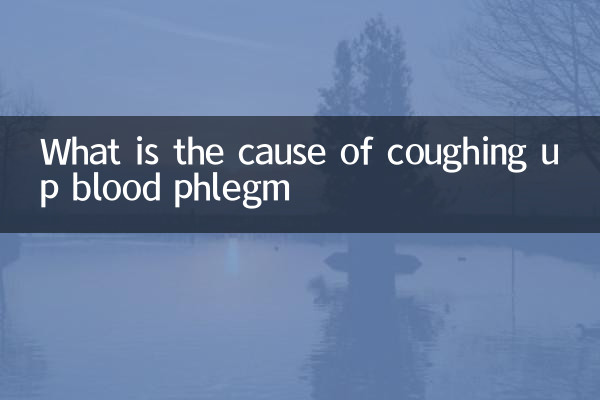What is the cause of coughing up blood phlegm? ——Comprehensive analysis and recent hot topics
Coughing blood (hemoptysis) is a worrying symptom that can be caused by a variety of diseases. This article will combine medical knowledge and recent hot topics on the entire network to analyze the common causes, related diseases and response measures for coughing up blood sputum, and attach recent hot topics related data.
1. Common causes of coughing up blood phlegm

| Cause classification | Specific diseases | Typical Characteristics |
|---|---|---|
| Respiratory Diseases | Bronchitis, pneumonia, tuberculosis, lung cancer | Accompanied by cough, chest pain, fever |
| Cardiovascular disease | Heart failure, pulmonary embolism | Difficulty in breathing, edema in the lower limbs |
| Trauma/Foreign object | Lung trauma, airway foreign body | Sudden, clear inducement |
| Systemic disease | Hematopathy, autoimmune disease | Multisystem symptoms |
2. Recent hot spot correlation analysis
Through tracking popular topics across the Internet in the past 10 days, the following hot events related to respiratory health were discovered:
| Hot events | Relevance | Discussion focus |
|---|---|---|
| Mycoplasma pneumonia is high | high | Symptoms of cough and fever in children and adolescents |
| Flu vaccination | middle | Respiratory Disease Prevention |
| Air quality warning | middle | Effects of haze on respiratory tract |
| Health risks of e-cigarettes | Low | Case of teenager coughing |
3. Detailed analysis of different causes
1.Respiratory infection: Mycoplasma pneumonia is very common recently, and some patients may have blood in the sputum. This type of infection is usually accompanied by symptoms such as fever and cough, and the amount of blood and sputum is small.
2.tuberculosis: It is still an important public health issue in the world. Typically, it is low afternoon fever, night sweats, long-term cough and hemoptysis.
3.Lung cancer: Smokers over 40 years old should be particularly vigilant. In the early stage, it may only show bloody phlegm, and in the later stage, chest pain and weight loss may occur.
4.Cardiovascular disease: Pulmonary congestion caused by heart failure may lead to pink foamy phlegm, which is an emergency.
4. When do you need to seek medical treatment immediately?
| Red flags | Possible Causes | Emergency |
|---|---|---|
| A large amount of hemoptysis (>100ml/time) | Bronchodilation, tuberculosis hole | Seek medical treatment now |
| With difficulty breathing | Pulmonary embolism, pneumothorax | Seek medical treatment now |
| Lasts for more than 1 week | Tuberculosis, tumors | Seek medical treatment as soon as possible |
| Smoking history + weight loss | Lung cancer | Seek medical treatment as soon as possible |
V. Diagnosis and treatment suggestions
1.Diagnostic process: Doctors usually arrange chest X-ray/CT, sputum examination, bronchoscopy and other examinations. Recently, AI-assisted diagnostic technology has become a hot topic and some hospitals have begun to use it.
2.Treatment principles: Treatment for the cause. Infection requires antibiotics, tuberculosis requires standardized anti-tuberculosis treatment, and tumors require comprehensive treatment.
3.Preventive measures: In light of recent hot spots of high flu, it is recommended that high-risk groups be vaccinated; reduce going out on smog days; quit smoking and limit alcohol.
6. Answers to recent hot search questions
Q: Will mycoplasma pneumonia cause blood coughing?
A: Some severe patients may have blood in the sputum, but large amounts of hemoptysis are rare.
Q: Can e-cigarettes cause blood coughing?
A: Recent studies have shown that e-cigarettes may cause acute lung injury, which can lead to hemoptysis in severe cases.
Q: Do you have to worry about lung nodules found during physical examination?
A: It is necessary to judge based on the characteristics of the nodules. Low-dose CT screening has become a hot topic recently, and it is recommended to follow-up follow-up according to doctor's advice.
Conclusion:Coughing up bloody sputum may be a sign of serious illness, especially during seasons when respiratory illnesses are more common. It is recommended to seek medical examination promptly and not to diagnose on your own. Pay attention to your own health and scientifically prevent respiratory diseases.

check the details

check the details